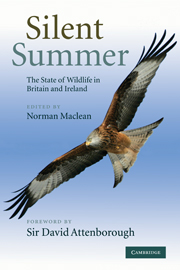Book contents
- Frontmatter
- Contents
- List of contributors
- Foreword
- Preface
- Acknowledgements
- List of abbreviations
- 1 Introduction
- PART I FACTORS DRIVING CHANGES IN WILDLIFE
- 2 Climate change
- 3 Agriculture, woodland and semi-natural habitats
- 4 Vertebrate animal introductions
- 5 Plant introductions
- 6 Urbanisation and development
- 7 The Great Game: the interaction of field sports and conservation in Britain from the 1950s to 2008
- 8 Going fishing: recent trends in recreational angling
- 9 Impacts of hormone-disrupting chemicals on wildlife
- 10 Water pollution: other aspects
- 11 Twenty-five key questions in ecology
- PART II CONSERVATION IN ACTION
- PART III THE CASE HISTORIES
- Glossary
- Name index
- Subject index
- Plate section
- References
10 - Water pollution: other aspects
Published online by Cambridge University Press: 05 August 2012
- Frontmatter
- Contents
- List of contributors
- Foreword
- Preface
- Acknowledgements
- List of abbreviations
- 1 Introduction
- PART I FACTORS DRIVING CHANGES IN WILDLIFE
- 2 Climate change
- 3 Agriculture, woodland and semi-natural habitats
- 4 Vertebrate animal introductions
- 5 Plant introductions
- 6 Urbanisation and development
- 7 The Great Game: the interaction of field sports and conservation in Britain from the 1950s to 2008
- 8 Going fishing: recent trends in recreational angling
- 9 Impacts of hormone-disrupting chemicals on wildlife
- 10 Water pollution: other aspects
- 11 Twenty-five key questions in ecology
- PART II CONSERVATION IN ACTION
- PART III THE CASE HISTORIES
- Glossary
- Name index
- Subject index
- Plate section
- References
Summary
Summary
The UK is home to a diverse array of aquatic organisms. However, it is also densely populated and our fresh waters have been subjected to a barrage of pollution over the last 150 years. The most widespread problem in the UK is eutrophication. Increased nutrient supply to lakes and rivers has caused a reduction in biodiversity, poorer water quality and a loss of amenity value to society. Acid deposition of sulfur and nitrogen oxides from fossil-fuel burning has altered the biological and chemical balance of many of our upland lakes and rivers, with adverse impacts on acid-sensitive species. Some of these sites are showing signs of recovery as levels of acid deposition have declined. An equally pervasive problem, and certainly less well studied, is pollution from persistent organic pollutants (POPs). Legislation and an increased awareness of the potential hazards has helped to reduce pollution, nevertheless there are few routine monitoring activities for POPs in our fresh waters and recent ad hoc studies show that pollution is still occurring from sources within and outside the UK. Pollution from heavy metals has occurred across the UK, and whilst direct sources have been reduced, diffuse pollution from atmospheric deposition is still a problem, especially where mercury is concerned. For many of these pollution issues, lake sediment studies and biological and chemical monitoring programmes have been invaluable in providing baseline data with which to assess environmental change. […]
- Type
- Chapter
- Information
- Silent SummerThe State of Wildlife in Britain and Ireland, pp. 141 - 155Publisher: Cambridge University PressPrint publication year: 2010

